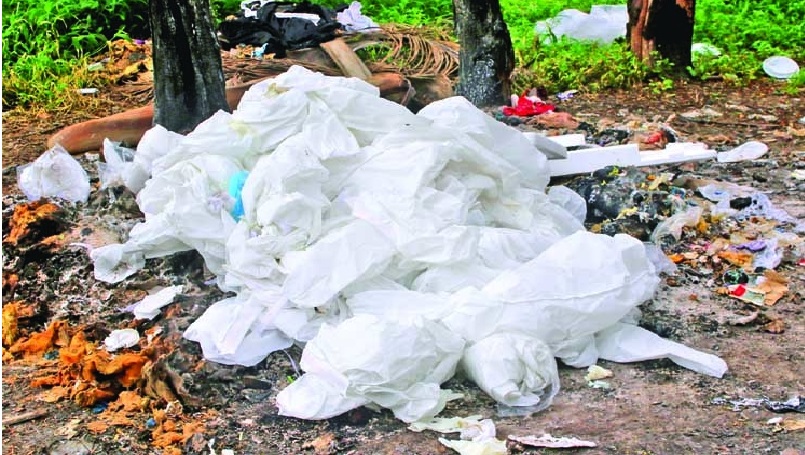
DoE preparing work plan

The Department of Environment (DoE) has taken an initiative to prepare a work plan to manage COVID-19 waste across the country as these waste are increasing infection risks and posing threat to environment.
"We have to go on a different approach to manage COVID-19 waste…we will finalise a work plan to manage COVID-19 waste across the country," DoE Additional Director General Md Humayun Kabir told BSS.
At the Secretariat on Friday (June 26), a meeting was held with all agencies concerned to find a possible solution for proper management of COVID-19 waste, said Dipankar Bar, Senior Information Officer of the Environment, Forest and Climate Change Ministry.
Since the beginning of coronavirus pandemic, people have been using COVID-19 safety gears including masks, goggles and hand sanitizers to protect themselves from the virus infection but they are indiscriminately dumping these throw-away materials everywhere, increasing infection risk to people.
Although the government has made the mask use mandatory in the fight against coronavirus, resulting generation of a huge amount of COVID-19 waste littering the drains, roads and other open spaces.
In addition, a huge amount of COVID-19 waste are being generated from hospitals every day as the number of COVID-19 patients is on the rise in thecountry. But there is no official data on how much COVID-19 waste are being generated across the country.
According to a survey of Environment and Social Development Organisation (ESDO), at least 14,500 tons of waste, including used gloves, masks, sanitizer containers and polythene, were generated across the country in a single month (April last).
The maximum amount of COVID-19 waste was generated from single-use hand gloves - a total of 5,877 tons, of which 3,039 tons were from plastic gloves and the rest 2, 838 tons from surgical gloves.About 5,796 tons waste was generated from polythene shopping bags, while 1,592 tons came from surgical masks and 900 tons from used hand sanitizer containers.
In April, Dhaka alone generated 3,076 tons of COVID-19 waste - 1,916 from gloves, 447 tons from surgical masks, 443 tons from polythene shopping bags and 270 tons from used hand sanitizer containers.
Humayun Kabir said COVID-19 waste generated from hospitals and individuals are posing threat to public health as well as polluting environment, while waste collectors often lack the protective gears to keep them safe from coronavirus infection.
The COVID-19 waste generated at the community level are being mixed with household waste, increasing the risk of infection, he said, adding that the COVID-19 waste should be managed through an different approach for its proper disposal to prevent infection risk.
According to experts, the COVID-19 situation might worsen in absence of the safe disposal of these materials like masks and gloves even after enforcing lockdowns or other measures.
Speaking at a recent press conference, ESDO General Secretary Dr Shariar Hossain said: "During our study we contacted some waste collectors who are not working right now as they fell sick. Some have fever and some are suffering from cough and none of them got the opportunity to test for COVID-19."
Stressing the need for science-based management of COVID-19 waste, Awami League General Secretary Obaidul Quader said proper science-based management of safety equipment used to prevent virus infection is an urgent matter now.
"Indiscriminate disposal of masks, goggles and sanitizer containers is increasing pollution and health risk as well. I request all to dump all these discarded items at designated places," he told a virtual press briefing on contemporary affairs from his official residence on Friday.Besides, Quader said, all the concerned have to pay attention on proper management of medical waste.
Editor & Publisher: S. M. Mesbah Uddin
Published by the Editor from House-45,
Road-3, Section-12, Pallabi, Mirpur
Dhaka-1216, Bangladesh
Call: +01713180024 & 0167 538 3357
News & Commercial Office :
Phone: 096 9612 7234 & 096 1175 5298
e-mail: financialpostbd@gmail.com
HAC & Marketing (Advertisement)
Call: 01616 521 297
e-mail: tdfpad@gmail.com